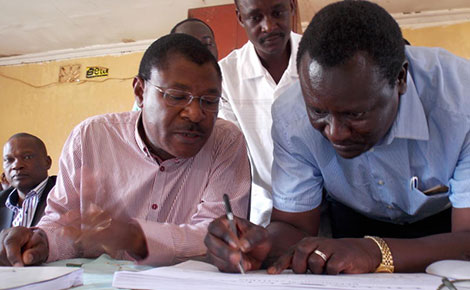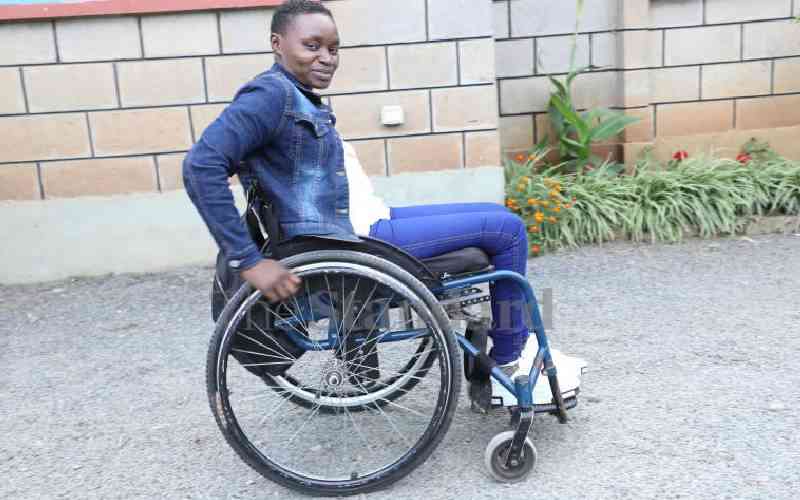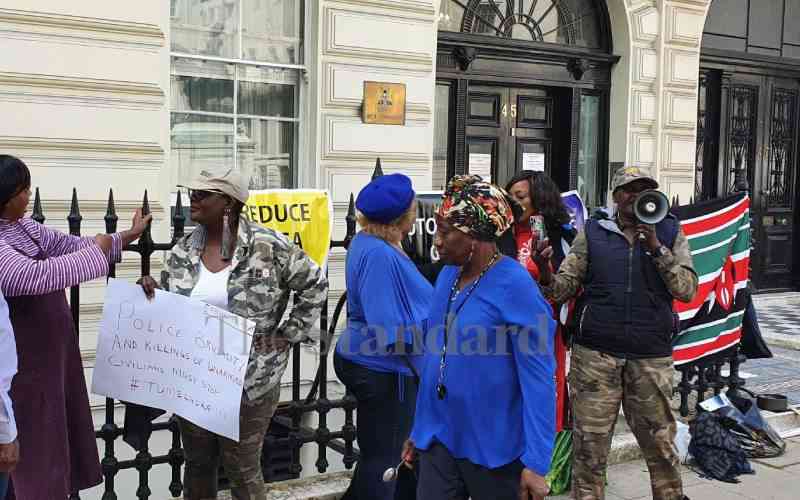 |
|
Bungoma Senator Moses Wetang’ula (left), witnesses as Butula MP Micheal Onyura okays collection of signatures for the Okoa Kenya initiative at St Catharine’s Special School Butula in Busia County, Friday. [PHOTO: BENJAMIN SAKWA/ STANDARD] |
CORD will continue collecting signatures to push for a referendum after the High Court declined to halt the process as a new survey shows support for the plebiscite is driven by push for more funds to the counties.
CORD leader Raila Odinga and governors have convinced three in every five Kenyans who support the referendum that their main reason is to amend the Constitution to have more money allocated to counties.
An opinion poll released yesterday by Ipsos Kenya Ltd (formerly Ipsos Synovate) shows that 62 per cent of supporters of the proposed national referendum believe that it is the only way to address inadequate funding to the counties.
The remaining 38 per cent – two out of every five people— support the referendum to get back at the Jubilee administration for what they say is “sabotage of devolution” and “failure to meet election promises”. Others think the plebiscite will help deal with corruption. While others simply want a referendum because they believe the Constitution has some clauses that need to be changed.
If the polls hold, it means that Raila’s Okoa Kenya Movement and the governors’ Pesa Mashinani campaign have to join hands to push the vote with the only agenda being to increase the money to the counties.
“Given the widespread support for devolution, the survey has revealed that those promoting the two partly overlapping and competing referendum initiatives have yet to convince a little over one-third of Kenyans that their efforts are worth it,” said Ipsos during the release of the polls conducted in the last week of August, and in which 2,021 people from all over the country were interviewed.
The bad news for the proponents of the referendum, led by the CORD leader and the Council of Governors Chairman Isaac Ruto, is that they do not have the numbers yet to ensure the Constitution is amended.
“Aside from devolution, the fact that one-third of Kenyans have “no confidence at all” in the IEBC – one of the key issues identified by the Okoa Kenya campaign - helps to explain why some Kenyans who do not support devolution nevertheless support a referendum,” Dr Tom Wolf, the Ipsos consultant behind the survey noted.
The overall data in the Ipsos survey shows that over half of Kenyans -54 per cent-- agree with President Kenyatta and his deputy William Ruto that there was no point in having a referendum. Only 38 per cent want the referendum, while eight per cent are undecided.
The numbers are predictable, because, most people who want a referendum are from the traditional strongholds of CORD in Western, Nyanza, Coast and Nairobi, while those in Jubilee strongholds of Central and Rift Valley do not think the plebiscite is important. Mr Wolf said the trend in the patterns is because most Kenyans tend to follow what their political leaders say.
Many of those who oppose the referendum say it is an expensive exercise at a time when “the government has no money”. Others dismissed the plebiscite as a “waste of time”; others insisted the “constitution was still young”, while some say it will cause disunity in the country.
Others rejected the referendum but they still insisted that “it can be conducted together with the next elections”.
And Kieni MP Kanini Kega had moved to court seeking to stop the process arguing that it was premature to amend the Constitution and the process of collecting the signatures was fraudulent but High Court Judge Justice George Odunga declined to issue the orders sought.
In his ruling Odunga said the court had the jurisdiction to hear and determine the suit and added that the MP has to prove to the court that he had constitutional issues that have to be determined.
“Parliament should enact a Bill to ensure that the referendum is held at the same time with General Election. The case cannot be said to be frivolous at this stage,” said the judge.
Stay informed. Subscribe to our newsletter
The MP’s lawyer Kibe Mungai asked the court to have the matter placed before the Chief Justice to have it heard and determined by a three judge bench.
In his petition through lawyer Kibe Mungai, Kega argues that it was only through a parliamentary initiative and in accordance with the provision of Article 256 of the Constitution that the law can be amended. The matter will be heard on September 23.
 The Standard Group Plc is a
multi-media organization with investments in media platforms spanning newspaper
print operations, television, radio broadcasting, digital and online services. The
Standard Group is recognized as a leading multi-media house in Kenya with a key
influence in matters of national and international interest.
The Standard Group Plc is a
multi-media organization with investments in media platforms spanning newspaper
print operations, television, radio broadcasting, digital and online services. The
Standard Group is recognized as a leading multi-media house in Kenya with a key
influence in matters of national and international interest.
 The Standard Group Plc is a
multi-media organization with investments in media platforms spanning newspaper
print operations, television, radio broadcasting, digital and online services. The
Standard Group is recognized as a leading multi-media house in Kenya with a key
influence in matters of national and international interest.
The Standard Group Plc is a
multi-media organization with investments in media platforms spanning newspaper
print operations, television, radio broadcasting, digital and online services. The
Standard Group is recognized as a leading multi-media house in Kenya with a key
influence in matters of national and international interest.









